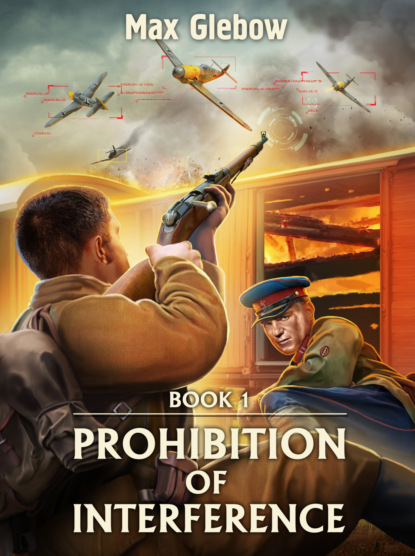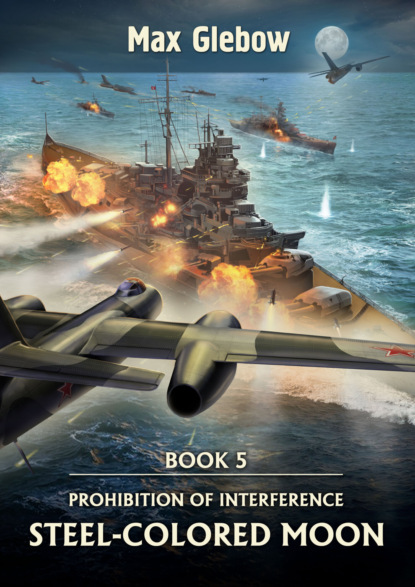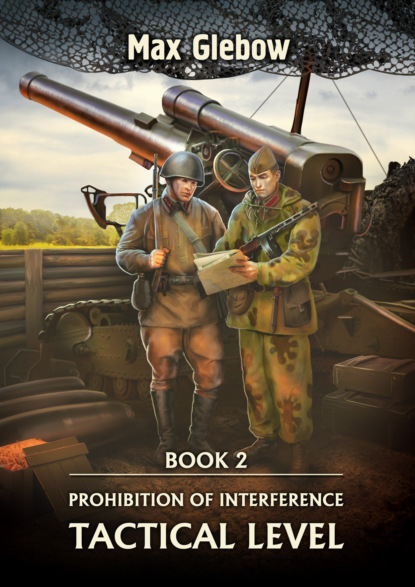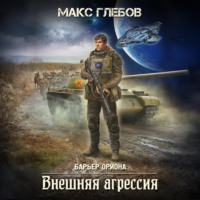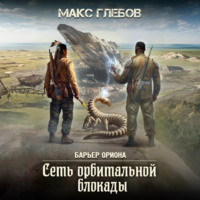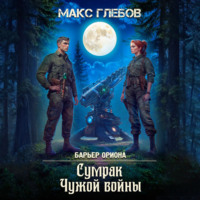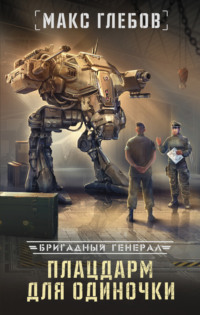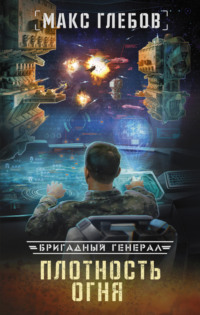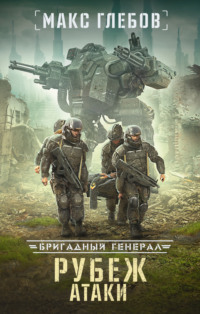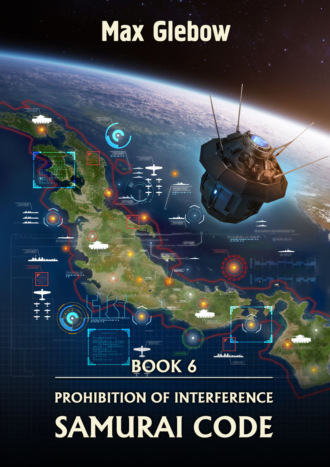
Полная версия
Prohibition of Interference. Book 6. Samurai Code
Without opening my eyes, I unfolded the virtual map. Colonel Lebedev's detachment moved among fairly high hills covered with dense southern forest. Sometimes there were terraces of fields right on the steep slopes, but they looked abandoned – the Chinese peasants did not seem to see the point of farming in areas that the Japanese could seize at any moment. We didn't meet any locals themselves either. Rumors of how the Japanese occupiers were treating the population spread quickly, and anyone who could go inland left their homes and became refugees.
Our unit certainly could not be called a walking hospital, but the three wounded, including me, greatly reduced its mobility. I was carried by Ignatov and Nikiforov. The two pilots found by Lebedev's men carried another stretcher. The third wounded man was carried by another pilot, along with the radio operator, who had been relieved of carrying the radio for the occasion.
In the maze of these high hills, the detachment had to move mostly through the winding lowlands, as it was extremely difficult to constantly climb up and down the slopes with the wounded in their arms. Colonel Lebedev had difficulty navigating these places, and if it had not been for the Chinese guide, he would have been able to keep the right direction only by compass. But the Japanese felt much more confident here. Two squads of thirty men each were moving five or six kilometers behind us, surrounding Lebedev's group from left and right, and there was really an ambush ahead of us.
I opened my eyes and met Lena's gaze. She walked beside my stretcher, remembering to look carefully over the lush green slopes for signs of danger in the jumble of branches and leaves of the subtropical forest.
“There's no one there, I would feel it,” I cautiously tried to smile, and I even succeeded. My head didn't respond to my words with a flash of pain, though I didn't hold out much hope for that.
“How are you feeling?” Lena abruptly stepped toward me and leaned over the stretcher.
Ignatov and Nikiforov stopped and a soft report flew down the chain of fighters forward to where Colonel Lebedev was walking: “The Commander’s come to his senses.”
How about that! Lebedev is the commander here, and it wouldn't even occur to me to challenge that.
“Better now,” I took my wife's hand and slightly lifted myself up on the stretcher. My body didn't protest. Even the headache receded a little more, but the head wound under the tight bandage began to itch wildly.
The soldiers gently lowered the stretcher onto the grass. I slowly raised my hand and groped my head. I could feel the big bump even through the bandage, but the shrapnel didn't seem to have broken through the bone. They make tough skulls in the Sixth Republic.
“Comrade Colonel General…” It was Lebedev, who appeared next to us silently as usual.
“Thank you for getting me out of there,” I glanced around the squad. “Did you find anyone else besides me?”
“Five people. Two wounded. Carried on a stretcher,” Lebedev reported clearly, “We have fifty kilometers to go through these hills to the places where we can be evacuated. The last communication with the airfield was an hour ago. Only half of the regiment was left, but we wiped out a lot of Japanese, all the hills near the shore were strewn with the wreckage of their fighters. We wanted to take some of the Japanese pilots prisoner and interrogate them, but there are no survivors – they don't take parachutes with them.”
“They won't let us go quietly,” I sat down slowly, stopping Lebedev, who tried to object, with a hand gesture. “There are a lot of Japanese around here. They are scouting the area before the planned landing. They probably already know about our unit, so we should expect visitors soon.”
I felt a little nauseous, but in general my body was just hinting that I should lie still for another ten hours instead of acting like a mountain goat, no, I don't want to, I'd rather be a panda. Or don't they live in these hills?
I got up slowly. This time no one tried to stop me. If a senior officer thinks he's ready to get in line, that's his decision, and one wouldn't give him advice, unless he's a doctor, of course.
“I need to go up to this peak,” I pointed to the top of the nearest hill ahead. There were no trees growing there, only grass and bushes, and the view from there was clearly better than from the low place.
“Ignatov, Nikiforov, Nagulina, you come under the command of the Colonel-General,” Lebedev ordered without asking any questions. “The rest of you, keep moving.”
If I had relied only on my own hearing, even if it were unique, I would not have been able to make out anything in the cacophony of cries of local animals, who were wildly enjoying life and eating each other in the crown of bushes and trees, but I managed to see something from the top of the hill, even without resorting to Letra.
A fairly wide and calm river with heavily overgrown banks flowed along the bottom of the narrow valley that opened to our eyes. The crowns of the trees almost closed over the water, but in some places there were gaps.
“Left bank, three and a half kilometers, a glade in the bushes.”
The sun was high and shining in our backs, so we could not be afraid of the glare of the optics, and Lena brought binoculars to her eyes.
“Three people. It looks like they are Japanese. They came out to look around, too. Arisaka-38 rifle, Type 99 machine gun… what the hell is that?” Lena held out her binoculars to me, but I just shook my head in the negative.
“Type 100 submachine gun. This is an exotic weapon. Hardly ever used by the regular army, but it has been produced in small batches for over a year.”
“They seem to be serious guys,” said Nikiforov softly.
“There are at least three dozen of them, and this is not the only unit.”
* * *“Korff, don't you think these Chinese planes turned out to be a little too tough and mean?”
“There aren't many of them left,” his deputy armament officer shrugged.
“But the Japanese lost almost two hundred fighters. Four to one!”
“When machines of different technological generations meet in battle, it can be even worse.”
“The question is, where did they come from?” the destroyer commander asked with irritation. “Something tells me that it was the infected people from the base on the satellite who gave the natives some of our technology. Computer, I need an estimate of the likelihood of interference.”
“My knowledge base does not have an algorithm for analyzing such situations. This requires a specialized neural network package. Only scientific stations in star systems belonging to underdeveloped civilizations are equipped with such a package.”
“So these people, on the satellite, have such a package?”
“It should be there, but only if the base's central computer survived.”
“So you can't tell if they passed on technology to the natives?”
“I can't, but the legal database has a set of instructions for science bases like this one. They are forbidden to interfere with the development of the civilizations they study.”
“Can't you see what's going on? They're infected! They don't give a damn about any instructions!”
“I have no data or algorithms to answer your question and assess the credibility of your claims. This is beyond the scope of my functional purpose.”
“You're just a brainless piece of iron,” said Hirch, cooling down a bit.
“Commander, permission…”
“I'm listening,” the Lieutenant Commander turned his gaze to the chief of engineering.
“It seems to me that it is not only and not so much about the technical characteristics of these planes, it's more about who is directing the pilots' actions and pointing them at the targets. Our computer, of course, cannot answer every question, but if we move sequentially and don't overload it with too complex tasks, that require creativity, it can be very useful.”
“Can you get to the point, Lieutenant?”
“The introductory part is over, Commander. So, I did an analysis of the Chinese pilots' actions in the night battle with Japanese ships, and the result was very interesting. First, these machines are not equipped with radars, which means they simply couldn't find aircraft carriers and destroyers in the night sea. No way! This led me to believe that our opponents were transmitting some kind of information to the wild infected people after all, and that they were supporting Japan's opponents.”
“Let us assume that this is true,” Hirch nodded, “go on.”
“And then I tried to figure out if the textual "advice from orbit" could have helped the Chinese pilots to sink an aircraft carrier and one of the destroyers? And the answer was unequivocal: they could not! In this way it is possible to bring the air group to the target, but how can you help pilots at night to hit a ship that is maneuvering intensely, with active anti-aircraft artillery and aviation opposition, with unguided bombs? The answer is, in fact, very simple. This can only be done by a person who is in the cockpit of the lead bomber and has the ability to use all the scanning, positioning and targeting technology provided by the satellite constellation.”
There was silence in the destroyer's command post. Hirch stared at the chief of engineering for a while in silence, then grinned and rose from his chair.
“Are you saying that some of the science base personnel are operating on the surface of the planet?”
“I have no other explanation for what we saw, and the further behavior of the Chinese pilots speaks in favor of this version.”
Hirch understood from the engineer's voice and facial expression that he was sincerely convinced of the correctness of his conclusions.
“One of their planes, the one leading the night attack, sustained significant damage and could not keep up with the speed of the entire group. Military expediency required them to leave the damaged plane and everyone else to leave at top speed. At the very least, they could provide one or two fighters to escort the comrade in distress to the Chinese coast. What did they do? They did exactly the opposite! They sent only the planes that had minor damage to the airfield, while the rest of the group remained to guard that plane, barely flying. Not only that, but fifty more fighter-bombers soon arrived to help them! Then, without any hesitation, they engaged the Japanese, who outnumbered them three to one and stubbornly defended the stretch of shore over which the pilot of that damaged plane had catapulted. By the way, it was he who dropped the first two bombs on the Zuikaku, directing the rest of the group to the target.”
“It's very interesting…” Hirch put his hands behind his back and took a few steps, looking thoughtfully at the holographic projection of the Pacific region of the planet, “And where is he now?”
“A group of paratroopers, landing from a transport plane, arrived for the pilots shot down in the air combat. They found some surviving pilots and are now moving through the rugged terrain deep into the continent. Their speed is slow as they have three wounded men.”
“Did they find our main man?”
“They probably did, or they'd still be scouring the coast. It's probably one of the wounded they're carrying on a stretcher.”
“I suppose the Japanese will be very interested to know that they still have a chance to get at the culprit of their latest trouble,” grinned Hirch, “and we'll watch. If he really is an infected person from the science base, he won't let them gobble him, but he will be forced to give himself away. Your version seems interesting to me, Lieutenant, except that without checking it out again, I'm not going to risk people; there are too few of us as it is. But if your assumptions are confirmed, we need to bring this infected man to our ship for a visit and talk to him, with all the necessary precautions, about what happened here, and why the cruiser Admiral Kuhn is now sadly circling around the satellite of this wretched planet in the form of space junk. I think he knows a lot about what anti-space defense systems are preserved on the satellite, and whether or not there are any combat-ready ships there.”
“Will there be work for us, too?” said the commander of the landing party nonchalantly. “ And I wondered how it was that the exercise scenario did not include tasks for my men. We ride as passengers and go crazy with boredom in endless training…”
“Prepare the landing craft, Lieutenant Cree. Checking the truth of the assumptions made is necessary, but I'm pretty sure our engineer is right – you do have a job ahead of you, and not an easy one at that. I'm not taking the ship into the system. We will exit the jump outside the outer asteroid belt, and then you'll have to go on your own in maximum camouflage mode.”
“A week in this tin can?” The paratrooper commander grinned, “My guys are stuck on the destroyer and are ready to spend even a month in a dropship, just to get some variety out of it. Permission to begin preparations?”
* * *“I got the impression that the Japanese decided to show themselves to us. They are the beaters. They want us not to linger here and break forward, trying to get away from them,” I told Lebedev at the end of the story about what we saw from the top of the hill. “There's bound to be an ambush up ahead.”
Lebedev had a map of the area, but its quality, to put it mildly, left much to be desired. To begin with, it was covered in hieroglyphics. As soon as the Colonel opened his clipboard, our shortish Chinese guide emerged from somewhere under his arm, he gazed into a mishmash of isohypses, conventional signs and inscriptions, and jabbed his finger at a certain point.
“We are here!” The Chinaman proudly said in Russian, with a strong Chinese accent, and stretched his lips in a smile.
“Thank you, Comrade Liang,” the Colonel nodded.
Letra immediately superimposed a grid of signs I could understand on the product of Chinese cartographers and marked the location of Japanese detachments with the help of augmented reality mode, and I, of course, immediately put this information into words and reported it to Lebedev, generously enriching my revelations with all kinds of "probably", "according to my estimates" and "if I were the enemy…". The Chinaman, by the way, indicated our location quite accurately.
The situation was changing rapidly, and if until an hour ago I thought that three Japanese detachments were all that threatened us, now it was obvious that the Japanese were determined not to let us leave under any circumstances.
Judging by the presence of three reconnaissance and sabotage groups on the Chinese coast, the Imperial Navy was preparing a large-scale landing operation, and we happened to get right into the area planned by the Japanese for the landing. The story of the sinking of the Zuikaku and the ensuing air battle roused enemy commanders and forced them to speed up preparations for the operation. Ships with marines, of course, could not approach the Chinese coast in such a short time, but the Japanese had an airborne force, some of which was subordinate to the Navy Command and some of which was subordinate to the Army Command. And now the army paratroopers were already loading into transport planes at the Karasehara airfield in the eastern part of Kyushu Island, and marine commandos were preparing to take off from Yokosuga Base on the shore of Tokyo Bay.
“Ivan, get the radio ready,” Lebedev ordered, “We won't last a couple of hours without air support. Group, take up a circular defense on the slopes of the hill, from which the Japanese were spotted. We are not climbing to the top of the hill. If the enemy points aviation at us, it becomes a very convenient reference point.”
The Colonel was doing everything right. I didn't see any other solutions in the current situation either. Breaking through the ambush that waited ahead of us in the narrow gorge, which was squeezed by fairly steep hillsides, was fraught with heavy losses, and an attempt to bypass it would most likely end up fighting in an unprepared position with unpredictable results. The rebels supplied the Japanese with information about our actions, and there was nothing I could do about it, so we could move on only after General Kudryavtsev cleared our way.
The problem was that after the air battle over the Chinese coast, Kudryavtsev had less than two dozen combat-ready planes left. Of course, many more planes returned from the battle, but a lot of them were damaged and could not take part in flights until they were repaired. Theoretically, that might have been enough. After all, burning out a Japanese ambush and pursuing squads with fuel-air bombs is not too difficult a task for pilots who know exactly where the enemy is and when to drop the bombs. Another thing is that the Japanese probably won't sit still and wait for a gift to arrive from heaven. They will begin to move actively, may decide to disperse, or even launch an attack to get as close to our positions as possible, making any air strike an extremely risky undertaking. That is, we need aviation support not in the form of a one-time bombing strike, but on a permanent basis. We can only move forward relatively safely if Kudryavtsev's ILs are hovering over our heads at all times, reacting instantly to any ground or air threats. But the Major-General may not have the forces to provide such support.
“The first five planes will be over us in thirty minutes,” Lebedev reported. “Three with bombs, two fighters. The guys are already taking off. In an hour they'll be replaced by the next five, and then they'll go on in that order. We'll start moving on, as soon as we see our planes.”
Fire contact with the enemy began with a shot by Lena, who gunned down a Japanese who had carelessly stepped onto the riverbank. Realizing they had been spotted, the enemy scouts hid in the bushes. There was no return fire.
The pause lasted ten minutes, after which the marks of the enemy soldiers on the virtual map came into motion, and all three Japanese units moved toward our positions almost simultaneously. I had no doubt before that their actions were coordinated by radio, but now it became a very obvious fact, and Letra was not able to jam the Japanese transmissions. The insurgents used retransmission of signals through their drones in orbit, protecting them with electronic warfare, not inferior in class to the equipment installed on our scientific satellites.
Of all the possible options, the Japanese chose the most unpleasant one for us – an immediate attack with all their forces. In principle, it was quite expected. This was very much in their spirit, in the style of the bushido code in its modern interpretation. But it didn't make us feel any better. If you don't count the wounded, then against almost a hundred samurai, who obviously were not the first time in these places, we had ten Lebedev's saboteurs, not badly trained, but not used to combat operations in the hills, overgrown with subtropical forests, plus three pilots who did not have the necessary skills, and me, who was difficult to qualify in any category. Visibility was poor, the enemy could get fairly close undetected, and in close combat almost everything is decided by numbers and density of fire. So we will prevent the enemy from approaching. Still, I will have to climb to the very top, otherwise it will be very difficult.
“Captain Nagulina, follow me!”
Lena is a sniper, and the best position for her is next to me, since I, too, am going to remember Uman and work again in this military specialty. The top of the hill is full of bumps and overgrown with tall grass, which in some places is very prickly and loves to cling to one’s clothes. There are some bushes, too, so there's more than enough room for a couple of snipers.
Japanese units have met, closed their flanks and are now tightening the ring. The commanders are pushing the soldiers. They obviously know that our planes will be here soon, and they want to at least hook up with us at a distance that will make an air attack impossible. The situation will be further complicated by the fact that the Japanese pilots also received appropriate orders, and the four army I-1 Falcons will be over us even before Kudryavtsev's planes, while the bombers and transports with paratroopers will arrive considerably later. Anyway, we don't have time for them right now.
What did I tell myself about the density of fire? There he is, the Japanese machine gunner. He's puffing his way up the slope through the thorny vegetation. He thinks we can't see him from our position. That's right, except the branches and leaves don't bother the scanners of the orbital satellites much, or my implants…
Shot! The soldier falls and rolls down the slope. The machine gun tumbles after him. I wasn't actually aiming at him, I was aiming at the machine gun, but the bullet must have bristled somewhere on a thick branch and deflected slightly. Shot! The officer bumps his face into the slope. No commander – no enthusiasm from his subordinates. Change of position.
“Lena, put a dozen bullets in there. I don't care if you can't see anything. Just let them slow down.”
A little lower down the slope, Nikiforov's machine gun fires several short bursts. The Lieutenant is saving his ammunition, but the nature of the battle is clear to him – he can't let the Japanese get too close. Shot! This time the officer is only wounded, but it's even better – the Japanese won't leave the commander behind.
The enemy have light mortars. Of course, they won't fire them in the thicket, but they may well try to shoot at us from the riverbank or from a small forest clearing. In fact, not only can they do it, but they are about to do it… Shot!
“Lena! The river bank. At three o'clock the position of mortar men!”
“Working on it.”
Shot! The Japanese are stubborn and almost devoid of any sense of fear. How can people be brainwashed into genuinely wanting to die on the battlefield? More eager to die in battle than to win! The ancient code of the samurai did not seem to require this, but its modern reading, seems to have changed the essence and meaning of the ancient doctrine somewhat.
The ring continues to tighten. This is no ordinary Japanese infantry, capable of confusion at the death of a commander. These are trained saboteurs who know how to act in such situations. Both of our machine guns are firing, no longer sparing ammunition. The Japanese answer mostly with rifles, and I try to keep a close eye on their machine gunners and stop their attempts to pin us to the ground. I don't always manage to do that, though. Shot! The Japanese submachine guns rattle away. The enemy has few of them, but they can be dangerous in close combat. I turn my attention to them, but there's no more time, new targets appear on the horizon.
The signal flares fly into the air – the enemy fighters are already on their way, and the Japanese indicate to the Falcon pilots their positions and the direction of the attack. Airborne targets are far more dangerous than Japanese soldiers with submachine guns, and I decide to take care of them. The familiar tingling in my palms suggests that my bio-implants have successfully taken over some of the work of pointing the weapon at the target. Shot! I wish I had a DShK heavy machine gun with its 12.7 caliber and crazy rate of fire, but I might as well have wished for a quadruple anti-aircraft gun. However, the Tokarev AVT-40 automatic rifle is also a very good piece in capable hands. Japanese fighters have no armor. The protection of the pilot is sacrificed to the speed and maneuverability of the aircraft, which means that my target is the cockpit. Shot! Shot!
Two Falcons lose control and crash into the ground, causing the remaining pair of Japanese planes to turn away from their target in an attempt to figure out where they're being fired from. I immediately shift my attention back to the approaching enemy soldiers. I no longer have to go back to the aerial targets – the swift silhouette of an IL is passing over the top of the hill. Kudryavtsev's pilots arrived on time, but there are very few of them. Wait, what kind of miracle is this?
“Letra, report! Why are there friendly marks in the southwest?”
“Don't get distracted. This is Claire Chennault's Flying Tigers air group. Americans. Mr. Roosevelt sends his regards.”
“Our pilots are about to take them for the Japanese and start tearing them apart!”


